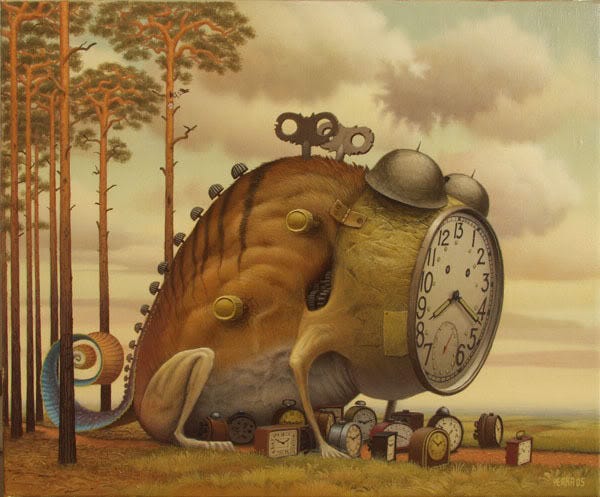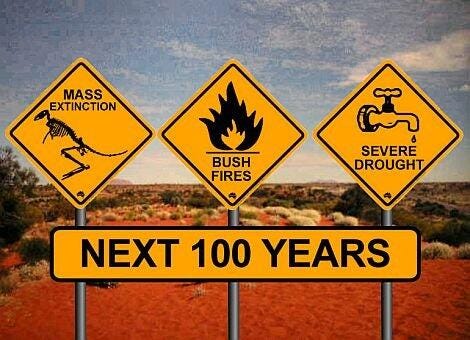
So far today my mind has been: worrying about how I’m ever going to finish my Ph.D.; contemplating what I will cook for dinner tonight; planning for a presentation tomorrow; speculating about an upcoming road trip; and occasionally dreaming (read: procrastinating) about building my own little house one day. The only time that my mind has been fully focused on the present moment was when my colleague offered me a chocolate brownie (and I ate it), and another moment when a poor bird flew into the glass window close to where I was sitting and dropped, twitching, to the ground. These brief interludes, one happy and one sad, distracted my mind’s temporal wanderings for a total of about 90 seconds out of the eight hours I have so far been awake today.
“So what?” you might well ask. We’re so used to our brains performing mental time travel, rushing to and fro to examine our pasts and our futures, that it’s easy to assume that this is simply “just what our minds do.” Indeed, the ability to imagine the future, and in particular a knack for utopian impulses towards the future has been one of the defining characteristics of the modern era, as the writer Anatole France (1844–1924) once suggested:
Without the utopias of other times, [people] would still live in caves, miserable and naked. It was utopians who traced the lines of the first city…Out of generous dreams come beneficial realities. Utopia is the principle of all progress, and the essay into a better future.
Climate change coaxes our gaze out towards future horizons and calls on us to draw on this individual and collective ability to imagine further and deeper into the future, to “dream generous dreams” more than ever before. Associated concepts like “the Anthropocene” and “tipping points” have more than a whiff of anticipation about them, fueling a desire to sense, predict, control, adapt to, and transform the future.

But what if this ability to imagine the future is as much a part of the problem as it might be part of the solution to climate change? What if it’s possible to take our mental time travel too far, rendering the mind less a creative powerhouse and more a hamster on a treadmill, convinced that it’s getting somewhere but really just exhausting itself and creating a mess?
This — minus the hamster comparison — is a suggestion made by many Eastern philosophies, especially Buddhism, and it offers (if you’ll excuse the pun) some pause for thought for people like me who are engaged in futures research.
In philosophical terms, the Buddhist tradition teaches that the mind is not separate from Earth, and therefore that our patterns of thought flow out into our environment. Incessant brain-chatter — the racing back and forth between past and future which generates feelings of dissatisfaction, craving, longing, and anxiety — is, according to this line of thought, a form of self-harm. By choosing to quiet our minds and focus on the present moment, the idea is that we can create the mental space and time to practice self-compassion, and this is a practice that sets in motion an ever-expanding circle of compassion for the Earth. And indeed, the evidence that practicing “being in the moment” is good for us seems very strong, evidently improving all sorts of things from our immune system to feelings of happiness.
But while the idea of ever-expanding circles of compassion is a lovely poetic notion, it can be difficult to see how changing our thought patterns might really, tangibly, change the world.
One suggestion of how it might is the idea that mindfulness (the practice of tuning out thoughts of past and future and focusing on the moment) can help us to access feelings of wonder and appreciation for the world around us on a more frequent basis. Even if it’s just an average sunset as you leave the office, or the beautiful eyes of the bird that hit the window earlier and now lies feet-up on the ground, there is often a lot more to wonder at in our everyday lives if we give ourselves half a chance (that is, the peace of mind to notice). It’s a truism that borders on corny, but the more we experience wonder, gratitude, and — ultimately — love for the world around us, the more we’re motivated to care. It’s a leap, of course, to suggest that caring inevitably leads to action, but it’s a start.
This does not mean that all people love nature; what it means…is that there is a universal propensity to love it, which may be drowned out by the noise that assails our minds. — George Monbiot
Another suggestion which emerges from Eastern philosophies is that, even as we scrabble frantically to think up solutions, invent technologies, develop scenarios, and devise theories in response to climate change, perhaps what we need more than anything is actually to stop, slow down, and listen for a little while. The general tendency (at least in the culture I’m accustomed to) is to want to think more and faster about the future in order to discover solutions and arrive at understandings, but a central pillar of Eastern philosophy is that thinking actually moves us away from understanding reality, rather than closer to it. In order to understand, we need to listen.
Sit, be still, and listen,
For you are drunk,
And we are at the edge of the roof. — Rumi
The frantic pace of society produces some of the major causes of climate change, and it might also prevent us from understanding the problems more clearly and responding to them in more effective (and coordinated) ways.
From a Buddhist perspective, a sane and sustainable economy would be governed by the principle of sufficiency: the key to happiness is contentment rather than an ever-increasing abundance of goods. The compulsion to consume more and more is an expression of craving, the very thing the Buddha pinpointed as the root cause of suffering. — The Time to Act is Now: A Buddhist Statement Declaration on Climate Change
This leaves me in a somewhat conflicted place as a futures researcher. There is clearly a need to think ahead — climate change leaves us with no other ethical choice — and in fact the ability to think about the future and acknowledge future predictions plays a significant role in motivating me to care in the first place. But what the perspectives of Eastern philosophies on time and mind offer, I think, is an everyday tool for actually living the kinds of changes that my future-thinking compels me to want to make. A Buddhist perspective on time, for example, does not mean excluding all thoughts about the future (cf. the declaration on climate change I quoted above), but it does encourage me to relate to my own mental faculties slightly differently. Cognitive thought about the future is a useful ability, but when I let it permeate every moment of my waking life it becomes a destructive, distracting force, both personally and environmentally.

What an Eastern philosophical perspective also offers is an alternative to the modernist view of the future as a trajectory, perhaps most commonly represented as a red arrow on a whiteboard traveling from the left (“now”) to the right (“then”). The future is always “over there,” somewhere ahead of us. By focusing more on the present moment as the only reality that will ever exist ( Eckhart Tolle writes, “nothing has happened in the past; it happened in the Now. Nothing will ever happen in the future; it will happen in the Now.”), Eastern philosophies invite us to adjust where we locate the future in our imaginations. In doing so, utopianism shifts from being a project with its gaze fixed on distant horizons to one which is very much about actions in the present moment. Ultimately, these actions add up to create the future just as much as any climate pledge, scenario, agenda, or target.
The future is not out there in front of us, but inside us. — Joanna Macy